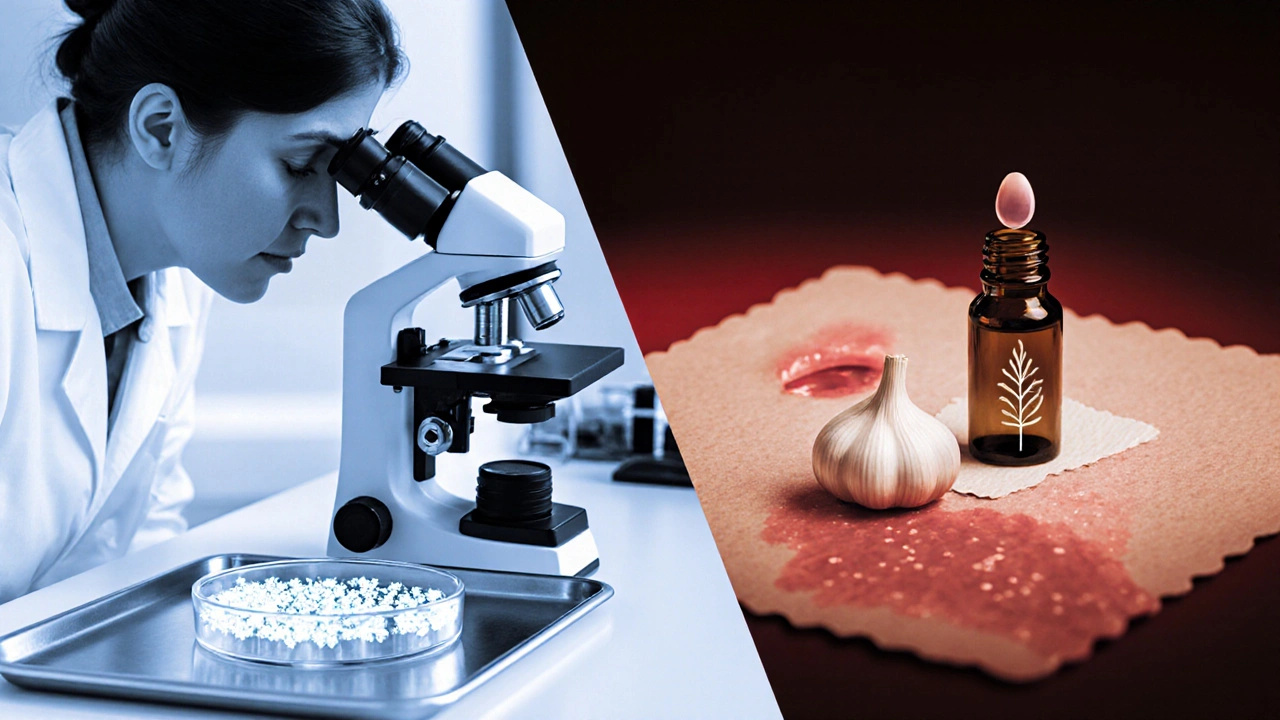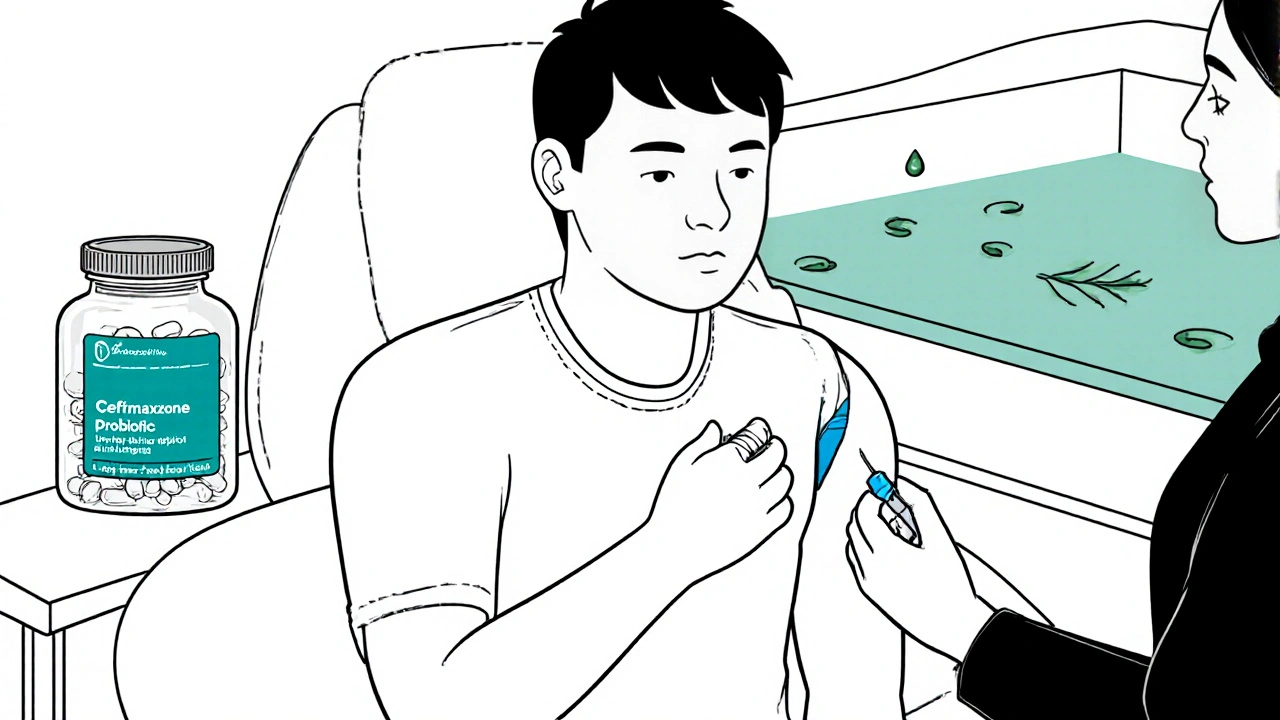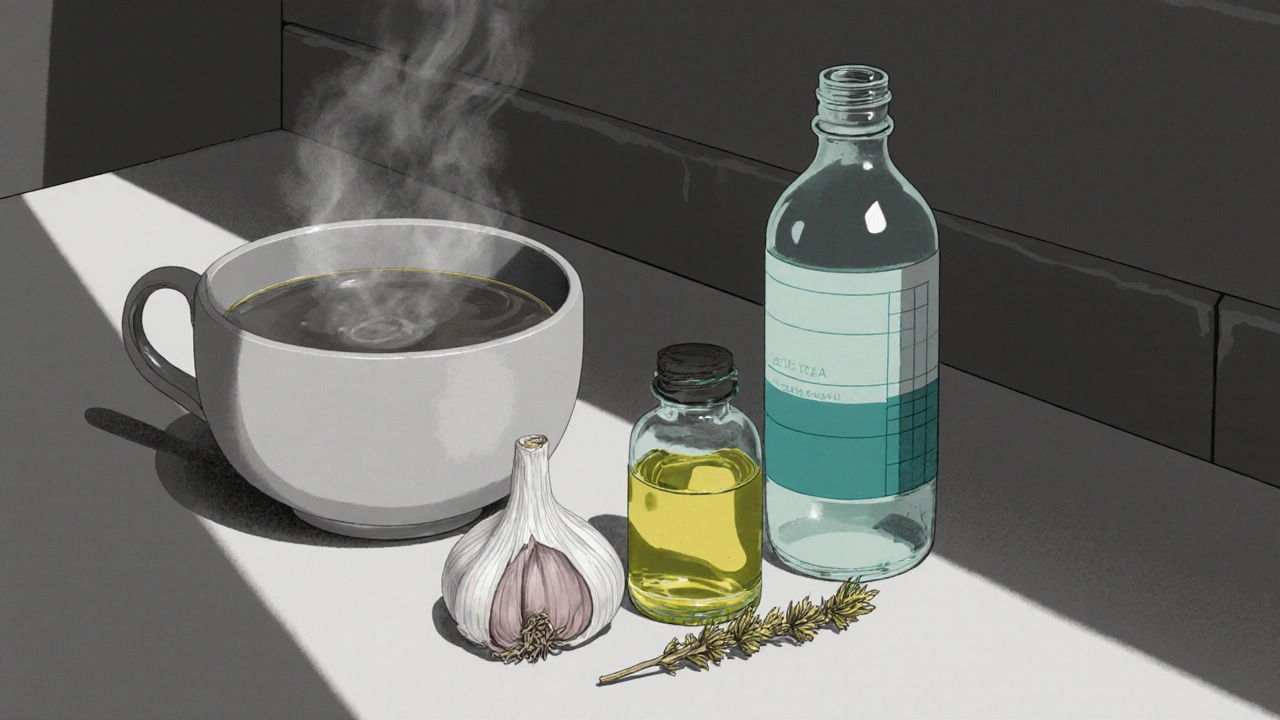When you hear the phrase natural remedies for gonorrhea, you might picture a garlic clove, a tea tree oil rub, or a cup of herbal tea that magically clears the infection. It sounds appealing-no prescription, no clinic visit, just something you can pick up at the grocery store. But does it actually work, or could it put you at risk?
Gonorrhea is a sexually transmitted infection caused by the bacterium Neisseria gonorrhoeae. It spreads through vaginal, anal, or oral sex and can affect the genitals, rectum, and throat. If left untreated, gonorrhea can lead to pelvic inflammatory disease, infertility, and increased HIV susceptibility.
Why People Turn to Natural Options
There are three main reasons folks look beyond antibiotics:
- Concern about growing antibiotic resistance - the ability of Neisseria gonorrhoeae to survive drugs that once killed it.
- Desire for privacy and convenience - buying a bottle of tea feels less exposing than a prescription.
- Belief in "natural is safer" - the idea that plant‑based compounds cause fewer side effects.
What the Science Says: A Quick Look at Commonly Cited Remedies
Below is a snapshot of the most frequently mentioned natural agents and what research actually shows.
| Remedy | Proposed Mechanism | Evidence Level (clinical/ lab) | Safety / Side Effects |
|---|---|---|---|
| Garlic (Allicin) | Disrupts bacterial cell walls | In‑vitro studies only | GI upset, odor; generally safe in food amounts |
| Tea Tree Oil (Melaleuca alternifolia) | Membrane permeability alteration | Lab studies on related strains; no human trials | Skin irritation, possible allergic reactions |
| Goldenseal (Berberine) | Inhibits bacterial DNA synthesis | Animal models; minimal human data | Can interact with prescription meds, liver toxicity at high doses |
| Echinacea | Immune modulation | Mixed lab results; no clear effect on gonorrhea | Rare allergic reactions |
| Probiotics (Lactobacillus spp.) | Compete with pathogens for mucosal space | Small pilot studies for other STIs; no direct gonorrhea data | Generally safe, occasional bloating |
| Ceftriaxone (injectable) | Inhibits cell‑wall synthesis | Gold‑standard clinical trials | Injection site pain, rare allergic reactions |
| Azithromycin (oral) | Blocks protein synthesis | Clinical guidelines, though resistance rising | GI upset, QT prolongation in susceptible patients |
Deep Dive: Garlic, Tea Tree, and Goldenseal
Let’s unpack three of the most talked‑about herbs.
Garlic contains allicin, a sulfur‑rich compound shown to kill a range of bacteria in petri dishes. Some small case reports claim symptom relief after high‑dose garlic supplements. However, the concentrations needed to kill Neisseria gonorrhoeae are far higher than you’d get from a clove or even a commercial supplement. No controlled human trial has proven efficacy, and relying on garlic alone can delay proper treatment.
Tea Tree Oil is an essential oil with broad antimicrobial activity, especially against skin pathogens. Lab work shows it can damage bacterial membranes, but it’s toxic to mucosal tissue at the concentrations needed to affect gonorrhea. Applying it inside the vagina or urethra risks burns and ulcerations, which actually facilitate infection spread.
Goldenseal supplies berberine, an alkaloid with antibacterial properties in test tubes. Human data are scarce, and high doses may harm the liver or interfere with prescribed antibiotics. Using goldenseal without medical oversight is not recommended.

What About Probiotics?
Probiotics are often marketed as a way to "balance" vaginal flora. While a healthy Lactobacillus population can lower pH and make the environment less friendly for some pathogens, their direct impact on an established gonorrhea infection is unproven. They may be helpful as a supportive measure after antibiotic therapy, but they cannot replace it.
Risks of Skipping Prescription Treatment
Choosing a natural remedy over the standard antibiotic regimen - typically a single intramuscular dose of Ceftriaxone plus oral Azithromycin - carries serious dangers:
- Persistent infection: Symptoms may linger or even worsen, increasing the chance of spreading the disease to partners.
- Complications: Untreated gonorrhea can cause epididymitis in men, pelvic inflammatory disease in women, and increased HIV transmission risk.
- Resistance escalation: Incomplete treatment fuels resistant strains, making future infections harder to cure.
Health agencies like the CDC warn that self‑treatment with unproven herbs could lead to these outcomes.
When a Natural Approach Might Make Sense
That’s not to say natural products are useless. They can be adjuncts in specific situations:
- After completing antibiotics: A probiotic regimen (e.g., Lactobacillus rhamnosus 10^9CFU daily for 2weeks) can help restore normal flora.
- Symptom relief: A warm sit‑z bath with a few drops of diluted tea tree oil (1% solution) may soothe irritation, but never insert the oil directly.
- Prevention of recurrence: Dietary garlic (2-3 cloves per day) can support overall immune health, but it isn’t a cure.
In each case, the natural element complements, not replaces, the antibiotic cure.

Practical Steps If You Suspect Gonorrhea
- Get tested. Many clinics offer rapid NAAT (nucleic acid amplification test) results within a day.
- Follow the prescribed regimen. Usually a single shot of Ceftriaxone 500mg IM plus Azithromycin 1g orally.
- Notify partners. Encourage them to test and treat to break the transmission loop.
- Consider adjuncts. If you want a probiotic, choose a clinically studied strain and discuss it with your provider.
- Avoid unproven solo remedies. Garlic, tea tree oil, and goldenseal may help with general wellness but won’t eradicate the bacteria.
Bottom Line: Do Natural Remedies Work?
The short answer: No, they don’t cure gonorrhea on their own. The longer answer is that many herbs show antibacterial activity in labs, but their concentrations, delivery methods, and safety profiles don’t translate to effective human treatment. Relying on them instead of FDA‑approved antibiotics puts you at real health risk.
If you value quick recovery and want to avoid complications, the proven route is a brief, supervised antibiotic course. Once the infection clears, you can safely incorporate evidence‑based natural supports for overall health.
Frequently Asked Questions
Can garlic cure gonorrhea?
Garlic contains allicin, which kills bacteria in a test tube, but the amount needed to eliminate Neisseria gonorrhoeae in a human body is far higher than anyone could safely consume. It may boost immune health, but it won’t replace antibiotics.
Is it safe to use tea tree oil inside the vagina?
No. Direct application to mucosal tissue can cause burns, ulceration, and increase infection risk. Diluted oil may soothe external irritation, but never insert it.
What’s the current first‑line treatment for gonorrhea?
A single intramuscular dose of 500mg Ceftriaxone plus a 1g oral dose of Azithromycin. This combination addresses the growing resistance seen in some strains.
Can probiotics help after gonorrhea treatment?
Yes, as a supportive measure. Probiotic strains like Lactobacillus rhamnosus can restore vaginal microbiota balance after antibiotics, potentially reducing recurrence of other infections.
What are the dangers of untreated gonorrhea?
If left untreated, gonorrhea can cause pelvic inflammatory disease, infertility, epididymitis, increased HIV transmission, and in rare cases, disseminated infection affecting skin and joints.


Justin Channell
Thanks for sharing the facts 🙏 keep taking the right steps 👍
Basu Dev
It is important to recognize that the bacterium Neisseria gonorrhoeae has developed sophisticated mechanisms to evade antimicrobial agents, and while natural substances such as allicin from garlic, berberine from goldenseal, and terpenes from tea tree oil have demonstrated some inhibitory activity in vitro, the concentrations required to achieve a bactericidal effect in a human host are far greater than those attainable through dietary consumption or topical application; moreover, the pharmacokinetic properties of these phytochemicals, including absorption, metabolism, and distribution, are not optimized for reaching the mucosal surfaces where gonococcal infection persists, which further limits their therapeutic potential; clinical trials that rigorously evaluate efficacy, safety, and appropriate dosing regimens for these natural agents in the context of gonorrhea are virtually nonexistent, and the existing anecdotal reports lack the methodological rigor needed to draw reliable conclusions; relying on unproven remedies can result in delayed diagnosis and treatment, thereby increasing the risk of complications such as pelvic inflammatory disease, epididymitis, and heightened susceptibility to HIV infection; the standard of care, as recommended by public health authorities, remains a single intramuscular dose of ceftriaxone combined with oral azithromycin, which has a well‑documented success rate in eradicating the pathogen and limiting the spread of resistant strains; that said, adjunctive use of probiotics after completing antibiotic therapy may help restore the normal vaginal flora and reduce the incidence of secondary infections, but this should be done under medical supervision; likewise, gentle supportive measures such as warm sit‑z baths with a highly diluted tea tree oil solution can alleviate discomfort but must never replace antibiotic treatment; the emerging threat of antimicrobial resistance underscores the need for continued research into novel therapeutics, yet at present the evidence base does not support recommending garlic, tea tree oil, goldenseal, or similar botanicals as standalone cures for gonorrhea; patients should be encouraged to seek prompt testing, adhere to prescribed regimens, and inform sexual partners to break the chain of transmission; in summary, while natural compounds may possess theoretical antimicrobial properties, their practical application in treating gonorrhea remains unsubstantiated and potentially hazardous if used in lieu of proven antibiotics.
Krysta Howard
This oversimplified hype about herbs is frankly reckless 😠 you cannot replace a CDC‑approved regimen with a kitchen spice, and anyone suggesting otherwise is ignoring clear clinical data; stick to evidence‑based treatment and keep the experimental stuff as a supplement only.
nica torres
Hey everyone, just a quick reminder that after you finish your antibiotics, adding a probiotic can help your body bounce back faster – it’s a small step that makes a big difference, so stay motivated and keep taking care of yourself!
Dean Marrinan
Oh sure, just sprinkle some garlic on your salad and hope the gonorrhea disappears – because that’s how modern medicine works, right? 🙃🌿
Oluseyi Anani
Let’s set the record straight: the only reliable way to eradicate gonorrhea is with the prescribed antibiotics; natural remedies may have their place in general wellness, but they are not a substitute for proven treatment, and ignoring this fact puts you and your partners at real risk.
Rahul yadav
Wow, reading through all this really hits home 😢 the stakes are high, and I truly empathize with anyone scared of side effects – just remember that the short‑term discomfort of a proper antibiotic course is nothing compared to the lifelong consequences of untreated infection.
Jonny Arruda
Use the prescribed meds, not kitchen herbs.
Ryan Pitt
Stay safe, get tested, and follow up with your doctor – you’ve got this!